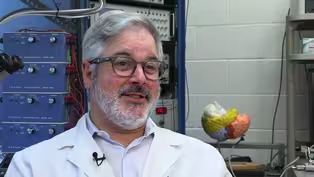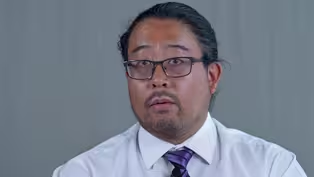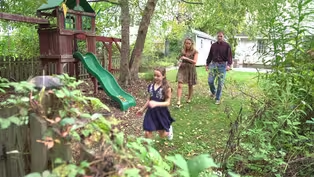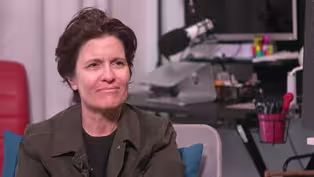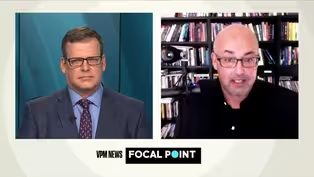VPM News Focal Point
AI and olfactory-implant systems: Dr. Richard Costanzo, VCU
Clip: Season 2 Episode 17 | 7m 33sVideo has Closed Captions
Dr. Richard Costanzo discusses deep brain stimulation research about the sense of smell.
This is an in-depth interview with Dr. Richard Costanzo, professor emeritus with Virginia Commonwealth University. Coverage of his research on olfactory-implant systems to help those afflicted with loss of smell is part of VPM News Focal Point’s look at the larger issue of computer-assisted medicine and the future of artificial intelligence in health care.
Problems playing video? | Closed Captioning Feedback
Problems playing video? | Closed Captioning Feedback
VPM News Focal Point is a local public television program presented by VPM
The Estate of Mrs. Ann Lee Saunders Brown
VPM News Focal Point
AI and olfactory-implant systems: Dr. Richard Costanzo, VCU
Clip: Season 2 Episode 17 | 7m 33sVideo has Closed Captions
This is an in-depth interview with Dr. Richard Costanzo, professor emeritus with Virginia Commonwealth University. Coverage of his research on olfactory-implant systems to help those afflicted with loss of smell is part of VPM News Focal Point’s look at the larger issue of computer-assisted medicine and the future of artificial intelligence in health care.
Problems playing video? | Closed Captioning Feedback
How to Watch VPM News Focal Point
VPM News Focal Point is available to stream on pbs.org and the free PBS App, available on iPhone, Apple TV, Android TV, Android smartphones, Amazon Fire TV, Amazon Fire Tablet, Roku, Samsung Smart TV, and Vizio.
Providing Support for PBS.org
Learn Moreabout PBS online sponsorshipRICHARD COSTANZO: I am Professor Emeritus of Physiology and Biophysics, and Otolaryngology Head and Neck Surgery.
Research Director of the Smell and Taste Research Center.
Well, I've been seeing patients for many years in our specialty center, and patients often come in and are looking for a solution, which we don't always have.
And so it wasn't until recently that technology advanced and there was a possibility of finding a way to restore a lost sense of smell.
Well, I think it started back around 1990s.
We had this idea, and in the laboratory, we started working with animal models to look at the sense of smell and study how to recreate the sense of smell.
And once we got enough data, we were able to start to transition toward making a device for humans.
Well, many of our patients who've lost their sense of smell completely feel a loss of the ability to enjoy life, to enjoy wines, fragrances, foods, and they also feel uncomfortable in dangerous situations.
For example, not being able to detect a gas leak or smoke for a fire in their homes.
Well, I think the biggest thing is to give hope to those who have been told for decades that there's nothing that can be done if your olfactory nerves or your olfactory system is severely damaged.
Well, early on in COVID, we noticed that patients were complaining that they lost their sense of smell.
And we did a number of survey studies here at VCU to show that there was a very strong link to loss of smell and the COVID virus.
In fact, the CDC came out shortly after some of our studies, making a loss of sense of smell and taste one of the main symptoms of COVID infection.
Well, we've always had people reaching out to us for help 'cause they knew about our work, but COVID definitely has made a big difference.
There are thousands and thousands of people who have not fully recovered from their loss, and there's a percentage of people who have a complete loss who still have not recovered.
So for those people, our device might actually help them restore some of their sense of smell.
Well, the big challenges were, one, surgically repairing broken olfactory nerves is almost impossible.
So we tried a number of strategies to improve the outcome of people when they were recovering.
For example, stem cell technology we used back in the '90s and early 2000.
And then we also were trying to find ways to reduce the amount of scarring so that nerves could grow back.
The advances in technology are making this possible.
It wouldn't have been possible two or three decades ago.
And now we have microelectronics that we can use to not only sense odors, gas sensors are available, but we also have computers that are able to learn and identify, recognize and identify various odors.
My simple view of artificial intelligence is programming computers to program themselves to learn from input that they get so that they can be more efficient.
For example, the electronic nose.
Well, we get contacted almost weekly from people who have reached out to us and said, "Can I volunteer?"
We're not there yet, but we do hope that in the future, we will have the ability to help these people restore their sense of smell.
Well, it's been estimated about 3% of the population has lost their sense of smell, so we're talking millions, maybe 10 million individuals who have a complete loss of smell.
And with COVID, we estimate another 1 or 2 million people have not recovered and have a loss of smell.
Well, I think there's two areas that we're working on that have made progress.
One is with the technology and computer programming to create an electronic nose that can detect and identify many, many different odors.
And the second is advances in brain science.
We're collaborating with a group at Mass General Hospital, with a neurosurgeon who was formerly a VCU student, and we're looking at the brainwaves and the brain activity of individuals when they smell different odors.
And what we're discovering or what we're working on is mapping where in the brain is perception of odor taking place?
That's still an unknown frontier.
The bionic nose is basically a sensor or sensors that pick up odors or vapors in the environment, smells or odors, if you will, and they encode that information into electrical signals that the computer can decipher.
And then using the computer, we hope to be able to recreate that sensation by stimulating the appropriate places in the brain.
Well, we've made huge advances.
Fortunately, we've had the support of a local foundation, the MEDARVA Foundation, who funded some of the early prototype research and animal model studies.
And more recently, we've had a person who's lost his sense of smell, who's come to help us and has set up a company called Sensory Restoration Technologies.
And through this company, he hopes to help us take this from the laboratory and from the research enterprise into commercialization.
The process will take a number of years, but we're beginning that process.
We get letters and emails all the time from individuals who have lost their sense of smell, and it expressed to us their frustrations that physicians keep telling them there's nothing that could be done.
And now we're providing hope for those people, and that's very gratifying.
I think we're probably 10 years out or more, but the advances we make every day are helping us get toward that goal.
We need to overcome barriers with the FDA and the safety issues, but I think all of that's something that can be solved.
There's a group in Europe who also is working toward the same goal, that is finding ways to restore the sense of smell, but I think we were the first to actually file a patent and develop the first prototypes.
Well, I think VCU has some unique resources.
We've had this specialty clinic for many, many years, and through the otolaryngology department, I met my collaborator, Dr. Coelho, who's a cochlear implant specialist.
And what we're doing is very similar to how a cochlear implant works.
And in a cochlear implant, there's hearing restored, in our device, it'll be smell restoration.
AI, implants & smell: Dr. Daniel Coelho, VCU Health
Video has Closed Captions
Clip: S2 Ep17 | 9m 2s | Dr. Daniel Coelho discusses deep brain stimulation research (9m 2s)
Artificial intelligence: What are the risks and benefits?
Video has Closed Captions
Clip: S2 Ep17 | 7m 46s | What does a future with artificial intelligence look like? We examine risks and benefits. (7m 46s)
Video has Closed Captions
Clip: S2 Ep17 | 2m 12s | Artificial intelligence is proving useful for medical breakthroughs (2m 12s)
Deep brain stimulation and disease: Dr. Paul Koch, VCU
Video has Closed Captions
Clip: S2 Ep17 | 10m 58s | Dr. Paul Koch discusses deep brain stimulation research and the treatment of disease. (10m 58s)
Epilepsy treatments: Dr. Kenichiro Ono, VCU Health
Video has Closed Captions
Clip: S2 Ep17 | 3m 17s | Neurologist Dr. Kenichiro Ono discusses deep brain stimulation and treating epilepsy. (3m 17s)
Is technology overuse hijacking our children’s brains?
Video has Closed Captions
Clip: S2 Ep17 | 3m 18s | A Chantilly, VA teacher says technology overuse is making kids less intelligent. (3m 18s)
Tech journalist and podcast host Kara Swisher talks about AI
Video has Closed Captions
Clip: S2 Ep17 | 19m 7s | Tech journalist and podcast host Kara Swisher says AI "can be a weapon but it’s a tool." (19m 7s)
Technology Expert on the Biggest Threats to Democracy
Video has Closed Captions
Clip: S2 Ep17 | 13m 36s | Expert says AI, fake news and social media are not the biggest threats facing democracy. (13m 36s)
Virginia Is The World’s Data Center Hub - What’s The Cost?
Video has Closed Captions
Clip: S2 Ep17 | 4m 37s | Most of the world’s internet data flows through Virginia. What do more data centers mean? (4m 37s)
Providing Support for PBS.org
Learn Moreabout PBS online sponsorship
- News and Public Affairs

Top journalists deliver compelling original analysis of the hour's headlines.

- News and Public Affairs

FRONTLINE is investigative journalism that questions, explains and changes our world.












Support for PBS provided by:
VPM News Focal Point is a local public television program presented by VPM
The Estate of Mrs. Ann Lee Saunders Brown
